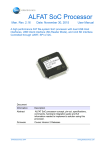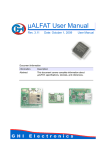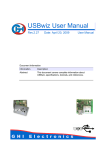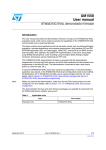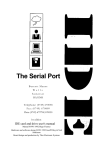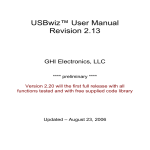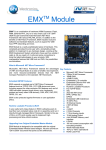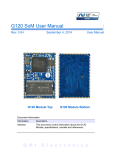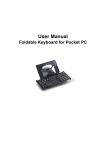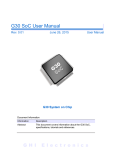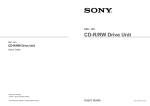Download ALFAT SoC Processor
Transcript
ALFAT SoC Processor
Rev. 1.13
Date: October 18, 2012
User Manual
A high performance FAT file system SoC processor with dual USB Host
interfaces and 4-bit SD interface. Controlled through UART, SPI or I2C.
Document
Information
Description
Abstract
ALFAT SoC processor concept, pin-out, specifications,
commands, hardware integration guide and full
information needed to implement a solution using this
processor.
Firmware
V1.08
GHI Electronics 2012
www.ghielectronics.com
GHI Electronics
ALFAT SoC Processor
Document Revision History
Rev No. Date
Modification
Rev 1.13 10/03/12 Fixed a mistake in SPI Interface Read Transaction description
Rev 1.12 09/25/12 Fixed I2C Interface section
Rev 1.11 08/13/12 Updated ALFAT design reference schematics: C16, C17
Fixed SPI interface "Response byte to Frame Type". The value
should be ignored.
Added RTC crystal specifications to Hardware integration guide
section
Rev 1.10 07/10/12 Added important notes to Full Speed / High Speed with ULPI
PHY section.
Added an important note to "I Initialize command" concerning
USB1 Initialization.
Added new features to J command.
Rev 1.09 06/21/12 Some SD cards do not work with high clock frequency SD-bus. "I
Initialize command" is modified to set different clock frequencies.
ALFAT command's terminator can be LF('\n') or CR ('\r').
Fixed "? Find File or Folder command" date format.
Clarified I2C addressing
Rev 1.08 06/05/12 Clarified card detect and write protection signals in the pin-out
and Initialize command sections.
Added Card Detect and Write Protect signals section.
Rev 1.07 06/01/12 Minor spelling errors.
Rev 1.06 05/29/12 Edited SPI Bus configuration section.
Added L command (Fast Write), SPI DMA receive channel.
Added new features to Z command.
Added new features to J command.
Added CD and WP pin description to pin-out table.
Fixed #WAKEUP pin description
Rev 1.05 05/11/12 Added integration guide and updated performance section.
Rev 1.04 04/16/12 Major changes to ALFAT access interface section (UART, SPI
and I2C) to match firmware version1.03. Busy pin is required to
be monitored.
Fixing B and K command description.
Rev 1.03 03/19/12 Fixes to multiple typos.
Clarifying some ambiguous points.
Rev 1.02 03/15/12 Adding 6.4.Updating the firmware using a terminal console
Fixes to 8.2.ALFAT SD board pin-mount tables
Rev. 1.13
Page 2 of 51
www.ghielectronics.com
GHI Electronics
ALFAT SoC Processor
Document Revision History
Rev No. Date
Modification
Rev 1.01 03/08/12 Updates to 4.3.SPI interface mode section
Updates to 6.2.Firmware Updater App
Rev 1.00 02/15/12 Preliminary document
Rev. 1.13
Page 3 of 51
www.ghielectronics.com
GHI Electronics
ALFAT SoC Processor
Table of Contents
Table of Contents
1.Introduction.......................................................................5
1.1.ALFAT SoC processor Concept...............................5
1.2.Example applications...............................................6
1.3.Key features.............................................................6
2.Architecture......................................................................7
2.1.Commander.............................................................8
2.2.FAT File System Engine...........................................8
2.3.Memory Card Access (SDHC, SD or MMC)............8
2.4.USB Mass Storage Access......................................9
2.5.Boot Loader.............................................................9
3.Package and Pin-Out ....................................................10
4.ALFAT access interface..................................................13
4.1.Selecting the access interface...............................13
4.2.UART Interface......................................................13
UART configurations..............................................14
4.3.SPI Interface Mode................................................14
Write Transaction...................................................14
Read Transaction...................................................15
SPI DMA receive channel......................................16
SPI Bus Configurations..........................................16
4.4.I2C Interface Mode................................................17
I2C Bus Configuration............................................17
5.ALFAT Command Set.....................................................19
V - Get Version Number.........................................20
# - Enable Echo......................................................20
Z - Set Low Power Mode........................................20
T - Initialize Real Time Clock..................................21
S - Set Current Time and Date...............................22
G - Get Current Time and Date..............................22
B - Set UART Baud Rate.......................................22
I - Initialize and Mount MMC/SD or USB................22
J - Read Status Register........................................24
K- Get Free Size....................................................25
@ - Initialize Files and Folders List........................25
N - Get Next Directory Entry..................................26
O - Open File for Read, Write or Append...............27
R - Read from File..................................................28
Rev. 1.13
W - Write to File.....................................................29
L- Fast Write to File (SPI mode only).....................29
F - Flush File Data..................................................31
C - Close File.........................................................31
P - File Seek...........................................................31
Y - File Tell.............................................................32
D - Delete File or Folder.........................................32
? - Find File or Folder.............................................33
M - Copy From File to Another ..............................33
A - Rename file ......................................................34
E - Test Media Speed.............................................34
Q – Format.............................................................35
6.Boot Loader and firmware update..................................36
6.1.General Description...............................................36
6.2.Firmware Updater App...........................................36
6.3.Boot Loader Commands........................................38
6.4.Updating the firmware using a terminal console....38
7.Hardware integration guide............................................41
7.1.Power Source........................................................41
7.2.Crystals..................................................................41
7.3.Card Detect and Write Protect signals...................42
7.4.Full Speed / High Speed with ULPI PHY...............42
7.5.Real Time Clock.....................................................43
7.6.Bootloader Access.................................................44
7.7.Electrical characteristics........................................44
8.ALFAT Off-the-shelf Circuit Boards................................45
8.1.ALFAT OEM Board................................................45
ALFAT OEM Pinout................................................45
8.2.ALFAT SD Board....................................................46
ALFAT SD Pin-out..................................................46
9.Conditions of Use and Performance..............................48
9.1.Selecting the Right Storage Media........................48
9.2.File Access Speed.................................................48
9.3.Serial Interface Speed Overhead..........................49
10.Error Codes..................................................................50
DISCLAIMER....................................................................51
Page 4 of 51
www.ghielectronics.com
GHI Electronics
ALFAT SoC Processor
Introduction
1. Introduction
1.1. ALFAT SoC processor Concept
Adding FAT file system to products requires a lot of resources from the system and needs
intensive development efforts. This also requires USB Host drivers and SD memory drivers
to be able o access storage medias such as SD cards or USB Mass Storage devices.
Additionally, licensing patented technologies, such as LFN is a lengthy and expensive
process. Thanks to ALFAT SoC Processor, any simple system can now access files on SD
cards and USB memory drives in a very short time, with minimal resources through simple
UART, SPI or I2C interface. ALFAT SoC processor is capable of accessing two USB mass
storage devices and one memory card simultaneously. This gives the user unique features
such as copying data from one media to another.
The Host MCU controls ALFAT through simple commands sent through UART (serial), SPI
or I2C. The commands give the host MCU the ability to access files on the storage media.
With ALFAT, file access rate can reach 4000 KBytes/sec.
An important advantage of ALFAT is that supports Long File Name LFN and it is licensed
by Microsoft for commercial use. Solutions that depends on ALFAT can use LFN
commercially without the need for any additional licensing.
Rev. 1.13
Page 5 of 51
www.ghielectronics.com
GHI Electronics
ALFAT SoC Processor
Introduction
1.2. Example applications
●
●
●
●
High speed Data loggers.
Automated Machinery.
Digital picture viewer.
Consumer products.
1.3. Key features
●
Built-in 2-port USB Host controller.
FAT16 and FAT32 File system.
No limits on media size, file size or file/folder count.
LFN (Long File Name), licensed by Microsoft.
Friendly user interface through UART,SPI or I2C.
Programmable UART baud-rate.
Up to 8 simultaneous file access.
SD/SDHC card support, no 2GB limit. GHI electronics is an SD
association member.
MMC card support.
Built-in 2x USB 2.0 FS PHY USB, 12mbps.
One USB ports is capable of HS 480mbps through external ULPI PHY.
High speed 4-bit SD card interface.
Up to 4000 KBytes/sec file access speed on SD cards.
Up to 4000 KBytes/sec file access speed on USB (with ULPI HS PHY).
●
Up to 1000 KBytes/sec file access speed on USB Full Speed (no ULPI HS PHY).
●
●
●
●
●
●
●
●
●
●
●
●
●
●
●
●
●
●
●
●
RTC (Real Clock Time) with separate power domain.
All I/O pins are 5 volt tolerant EXCEPT RESET PIN.
Small surface mount package, LQFP 64 pin.
Single 3.3V power source.
Low power consumption, 38mA fully operational and 5mA in hibernate.
-40˚C to +85˚C operational temperature.
RoHS Compliant/Lead free.
Rev. 1.13
Page 6 of 51
www.ghielectronics.com
GHI Electronics
ALFAT SoC Processor
Architecture
2. Architecture
ALFAT SoC processor is an ARM Cortex-M3 processor that runs a robust file system
engine with SD and USB host (mass storage) drivers. The processor access storage
media though its 4-bit SD interface and two USB host 2.0 interface. One of the USB host
ports is capable running at high speed 480mbps with external ULPI HS PHY chip.
ALFAT SoC processor provides 3 different standard access interfaces for the host system,
UART, SPI or I2C.
Boot Loader
UART
ALFAT SoC
Processor
SD/miniSD/μSD
SDHC
MMC card
USB MS
Device
USB1 FS
USB1 HS
8bit bus
Page 7 of 51
USB1 HS
USB Host
Connector 1
SD/μSD
MMC socket
USB Host
Connector 0
SDHC/SD/MMC
Driver
USB0 FS
ARM Cortex-M3 Core
Rev. 1.13
Host System
AVR, PIC ...etc
4-Bit SD Bus
USB Host driver with
Mass Storage class driver
and 8 file handles simultaneously
can handle 3 different storage medias
FAT File System Engine
Commander
UART,SPI
or I2C
ULPI HS PHY
(P/N FUSB2805)
optional
User/machine friendly
USB MS
Device
www.ghielectronics.com
GHI Electronics
ALFAT SoC Processor
Architecture
2.1. Commander
The function of the commander is to provide the user with a protocol and a set of
commands to control the processor and access the files on the storage devices.
The physical interface that the user (the host system) can use to access the commander is
UART, SPI or I2C serial port.
Commands are human-readable ASCII format. This allows for easier development and
troubleshooting. But at the same time, the commands are designed to be easy to parse by
the the host software.
2.2. FAT File System Engine
The function of the file system engine is to handle accessing the file system according to
FAT standards. It has been optimized for high speed access and with high performance.
Here are some of the capabilities of this engine:
●
FAT16, FAT32.
●
Licensed Long File Names support. Licensed to be used on ALFAT by Microsoft.
●
Access up to 16 opened files simultaneously.
●
Complete directories (folders) support.
●
File access functions include read, write, append, seek, tell, find, delete, remove
folder ...etc.
●
High speed read or write access, up to 4000KBytes/sec.
●
No limits on media size, file size or file/folder count.
It is important to note here that the 16 file handle limit is only on how many simultaneous
files are open. ALFAT SoC processor Has no limits on how many files can be opened and
closed.
2.3. Memory Card Access (SDHC, SD or MMC)
ALFAT SoC processor includes memory card driver
internally that supports SD, SDHC and MMC cards. This
gives ALFAT the ability to access a wide range of
memory cards such as standard or high capacity
SD/μSD cards or multimedia cards. There is no limit on
the card capacity.
Unlike typical solutions that access the card through
SPI-based interface, ALFAT's hardware provides a 4-bit
SD bus interface for higher performance.
GHI Electronics is a member of SD association.
Rev. 1.13
Page 8 of 51
www.ghielectronics.com
GHI Electronics
ALFAT SoC Processor
Architecture
2.4. USB Mass Storage Access
ALFAT SoC processor is capable of accessing FAT file system files on
USB mass storage devices. The hardware provides two standard Full
Speed* USB 2.0 compatible host interfaces (USB0 and USB1) that
use the internal USB PHY. Only 22ohm resistors and USB host
connector is needed.
USB1 interface is also capable of running in USB 2.0 High Speed mode by
adding ULPI High Speed+ PHY chips like FUSB2805. This options quadruples
the file system access speed.
*Full-Speed USB 2.0 is 12mbps.
+
High-Speed USB 2.0 is 480mbps.
2.5. Boot Loader
The boot loader is a piece of software that boots the system up. It verifies and runs ALFAT
firmware. Also It gives the hosting system an interface for firmware maintenance.
GHI Electronics regularly maintains ALFAT firmware with improvements and bug fixes.
ALFAT boot loader allows the hosting system to update the firmware.
The boot loader can only be accessed through the UART port and it uses XMODEM 1K to
transfer the firmware file to ALFAT. Boot Loader and firmware update section explain this in
more details.
Rev. 1.13
Page 9 of 51
www.ghielectronics.com
GHI Electronics
ALFAT SoC Processor
Package and Pin-Out
3. Package and Pin-Out
ALFAT SoC package is standard 10x10mm LQFP64. The following Table illustrates a brief
description of ALFAT SoC processor pins.
Pin Name
Description
1
VBAT
Power source for the internal RTC. Connect to 3V battery or
VCC. Always use 2 diodes to connect a battery and VCC in case
the battery runs out of power. VBAT works 1.65V to 3.6V.
If RTC is not needed, connect to VCC
2
NC
Should not be connected
3
OSC32_IN
Pin 1 for the 32.768KHz crystal, for the real time clock. Optional
4
OSC32_OUT
Pin 2 for the 32.768KHz crystal, for the real time clock. Optional
5
OSC_IN
Pin 1 for parallel-cut 12MHz system crystal. 10pF to 20pF is
recommended
6
OSC_OUT
Pin 2 for 12MHz system crystal
7
RESET
Reset signal, the pin pulled up internally. Active Low.
THIS PIN IS NOT 5VOLT TOLERANT
8
USB1_ULPI_STP USB High Speed PHY signal. Do not connect if PHY is not used
9
NC
Should not be connected
10 USB1_ULPI_DIR USB High Speed PHY signal. Do not connect if PHY is not used
11 USB1_ULPI_NXT USB High Speed PHY signal. Do not connect if PHY is not used
12 VSSA
Ground
13 VDDA
3.3V Power source
14 WAKEUP
Wake up ALFAT, check power mode command Z for more details
15 NC
Should not be connected
16 NC
Should not be connected
17 USB1_ULPI_D0
USB High Speed PHY signal. Do not connect if PHY is not used
18 VSS1
Ground
19 VDD1
Power, 3.3V
20 ACTIVE
Active signal indicates the current status of command
processing. Useful for a system-activity-LED, max 8mA.
On UART: Active pin is high when a command is received and
Rev. 1.13
Page 10 of 51
www.ghielectronics.com
GHI Electronics
ALFAT SoC Processor
Package and Pin-Out
Pin Name
Description
being processed. Low when command is complete.
Note: The command is considered complete when ALFAT is done
sending the response to the command. This is automatically
completed in UART but SPI and I2C are slaves so ACTIVE pin
will go low after the master reads the response.
It is completely safe to ignore this signal and keep it not
connected.
21 USB1_ULPI_CK
22
SPI_MISO
UART_BUSY
USB High Speed PHY signal. Not connected if PHY is not used
MISO SPI interface and UART BUSY pin, 5V tolerant
23 SPI_MOSI
MOSI SPI interface, 5V tolerant
24 WP
SD Write protection signal input. Low = card not protected.
Note: WP MUST be connected to ground if Write protection
signal is not used in the hardware design.
25 CD
Memory Card Detect signal input. Low = card detected.
Note: CD MUST be connected to ground if Card Detect signal is
not used in the hardware design.
26 USB1_ULPI_D1
USB High Speed PHY signal. Do not connect if PHY is not used
27 USB1_ULPI_D2
USB High Speed PHY signal. Do not connect if PHY is not used
28 BOOT1
Add a 10K resistor to ground.
29 USB1_ULPI_D3
USB High Speed PHY signal. Do not connect if PHY is not used
30 USB1_ULPI_D4
USB High Speed PHY signal. Do not connect if PHY is not used
31 VCAP_1
Connect to a 22uF to ground
32 VDD1
Power, 3.3V
33 USB1_ULPI_D5
USB High Speed PHY signal. Do not connect if PHY is not used
34 USB1_ULPI_D6
USB High Speed PHY signal. Do not connect if PHY is not used
35 USB1_DM
Data Minus, USB Port 1. This is only used if no HS PHY is
installed.
NC if PHY is used. Add 22ohm resistor in series if used
36 USB1_DP
Data Plus, USB Port 1. This is only used if no HS PHY is
installed.
NC if PHY is used. Add 22ohm resistor in series if used
37 NC
Should not be connected
38 NC
Should not be connected
39 SD_D0
D0, 4-bit SD Bus. Add a 47K resistor between this pin and VDD
40 SD_D1
D1, 4-bit SD Bus. Add a 47K resistor between this pin and VDD
Rev. 1.13
Page 11 of 51
www.ghielectronics.com
GHI Electronics
ALFAT SoC Processor
Package and Pin-Out
Pin Name
41 ULPI_19_2MHZ
Description
This pin generates 19.2MHz clock. It is usually used to clock the
USB High Speed PHY
42 UART_TX
TX UART interface, 5V tolerant
UART_RX
43 SPI_BUSY
I2C_BUSY
RX UART interface BUSY pin for SPI and I2C, 5V tolerant
Add a 10K resistor between this pin and VDD
44 USB0_DM
Data Minus, USB Port 0. Add 22ohm resistor in series
45 USB0_DP
Data Plus, USB Port 0. Add a 22ohm resistor in series
46 NC
Should not be connected
47 VCAP_2
Connect to a 22uF to ground
48 VDD3
Power, 3.3V
49 NC
Should not be connected
50 SPI_SSEL
SSEL SPI interface, 5V tolerant
51 SD_D2
D0, 4-bit SD Bus. Add a 47K resistor between this pin and VDD
52 SD_D3
D1, 4-bit SD Bus. Add a 47K resistor between this pin and VDD
53 SD_CLK
CLK, 4-bit SD Bus
54 SD_CMD
CMD, 4-bit SD Bus. Add a 47K resistor between this pin and
VDD
55 SPI_SCK
SCK SPI interface, 5V tolerant
56 NC
Should not be connected
57 USB1_ULPI_D7
USB High Speed PHY signal. Add a 10K resistor to VDD.
Only add10K resistor if HS PHY is not used
58 I2C_SCL
SCL I2C Interface
59 I2C_SDA
SDA I2C Interface
60 BOOT0
Should not be connected. It is safe to have pull up or down
resistor on this pin.
61 NC
Should not be connected
62 NC
Should not be connected
63 VSS2
Ground
64 VDD4
Power, 3.3V
Note: All pins have internal weak pull ups, leaving them unconnected is safe.
Rev. 1.13
Page 12 of 51
www.ghielectronics.com
GHI Electronics
ALFAT SoC Processor
ALFAT access interface
4. ALFAT access interface
ALFAT is controlled through UART, SPI or I2C serial interfaces. 2 pins are sampled on
power up to determine the interface. The pins are SPI_SSEL and SPI_MOSI.
4.1. Selecting the access interface
On power up, the system should hold ALFAT in reset state until the power is stable. This is
done by holding reset pin low. Then, pins SPI_SSEL and SPI_MOSI must be set to the
desired serial interface, UART, SPI, I2C or even to force the boot loader. The boot loader is
needed for firmware updates. Those pins have internal pull-down resistor so an
unconnected pin is considered low. After pins are set, the reset pin must be set to high
state to allow ALFAT to boot up. Note that the reset pin is NOT 5V tolerant.
ALFAT needs about 30 milliseconds to sample these pins from the time reset pin goes high
then it needs a bit more to initialize the system. We recommend a 50 milliseconds delay
before sending any commands to ALFAT. If the selected interface is SPI, these pins can
be change to their appropriate SPI functions; otherwise, it is safe to leave the pins in the
same state used on power-up.
SPI_SSEL SPI_MOSI
Interface
low
low
UART
low
high
Boot loader
high
low
I2C
high
high
SPI
4.2. UART Interface
UART interface uses three hardware signals:
•
UART_TX signal to send data out from ALFAT.
•
UART_RX signal to receive data to ALFAT.
•
UART_BUSY signal. This should be monitored while sending data to ALFAT. When
it is high, no more data should be transmitted to ALFAT till it gets low.
Note: ALFAT access reference code library, available with ALFAT's downloads, provides an
example how to use UART interface.
Rev. 1.13
Page 13 of 51
www.ghielectronics.com
GHI Electronics
ALFAT SoC Processor
ALFAT access interface
UART configurations
•
The default baud rate is 115200. The maximum tested baud rate is 3M. To
change the baud rate use B command.
•
Data bits: 8
•
Parity: None
•
Stop bit: 1
4.3. SPI Interface Mode
SPI interface uses four hardware signals:
•
SPI_SSEL: ALFAT Chip Select.
•
SPI_MOSI: ALFAT Data in.
•
SPI_MISO: ALFAT Data out.
•
SPI_BUSY: This should be monitored while sending data to ALFAT. When it is high,
no more data should be exchanged with ALFAT till it gets low.
Note: ALFAT access reference code library, available with ALFAT's downloads, provides an
example how to use SPI interface.
Sending and receiving data to and from ALFAT over SPI is performed through frame
transactions which is a layer that resides between the actual SPI data bus and the
communication stream (commands, responses, data). It is important to know that SPI
frame transaction layer is independent from how ALFAT commands work.
Communication Stream
@ M:\TEST\TMP<LF>
Frame Transaction
SPI Bus
Write Frame: T\TMP<LF>
Write Frame: @ M:\TES
01
08
00
'@'
' '
'M'
':'
'\'
'T'
'E'
'S'
01
06
00
'T'
'\'
'T'
'M'
'P'
0x0A
Write Transaction
Request Frame
The frame consists of two parts, a header and payload.
•
The header consists of three bytes. The first byte is the frame type, the second
and the third bytes are 16-bit transaction length (Not including the header).
•
Payload: This is actual transaction payload needed to be sent to ALFAT. The
payload section size MUST match the declared in the transaction size field.
Rev. 1.13
Page 14 of 51
www.ghielectronics.com
GHI Electronics
ALFAT SoC Processor
ALFAT access interface
Frame
Type
16-bit Transaction
Size N
0x01
Size LSB Size MSB
Payload
Byte 1
Byte 2
...
Byte N
RFB
RFB
...
RFB
Response Frame
Ignore
RFB
RFB
RFB is Ready Flag Byte.
When a write transaction request is being sent, ALFAT returns zero with the first
received byte (Frame Type) and then it returns a ready flag with the received second
byte (Size LSB).
If the ready flag is 0x00, this means that ALFAT is not ready to receive any data over
SPI. The current transaction gets terminated and the user must not send more bytes for
this frame.
If the ready flag is 0x01, this means that ALFAT is ready to receive and the user can
proceed and send Size MSB and the payload bytes.
Read Transaction
Processing read transaction is preformed by sending read request frames and receiving
response frames that carry the useful payload.
Request Frame
The frame consists of two parts, a header and stuffing bytes.
•
The header consists of three bytes. The first byte is the frame type, the second
and the third bytes are the requested 16-bit transaction length.
•
Stuffing bytes: the bytes should always be 0x00. This section size should equal
P, where P is the actual payload size that ALFAT will send back.
Frame
Type
0x02
Requested
Transaction
16-bit Size N
N LSB
N MSB
Stuffing Bytea, the size is P.
0x00
0x00
0x00
0x00
Response Frame
The frame consists of two parts, a header and payload.
•
The header consists of three bytes. The first byte is ignored, the second and the
third bytes are 16-bit value ACT that indicates the actual data size available in
the send buffer of ALFAT. ACT value could be more or less that N (the requested
transaction size)
•
Payload: This is the actual transaction payload that is being send out from ALFAT
to the host. This section size is P.
Rev. 1.13
Page 15 of 51
www.ghielectronics.com
GHI Electronics
ALFAT SoC Processor
ALFAT access interface
That actual Payload size is calculated as the following: If the requested transaction size
N is larger than ACT then P should equal ACT otherwise P should equal N.
Response
to frame
type
Internal buffer filled
portion
16-bit Size ACT
Ignore
ACT LSB ACT MSB
Payload Bytes, the size is P
if N > ACT then P = ACT else P =N
Byte 1
Byte 2
...
Byte P
Important: ACT size should be used only for data size estimating purposes because
the send buffer might get filled with more data while processing the read command.
SPI DMA receive channel
This internal DMA channel that is used for high speed data receiving through SPI bus.
ALFAT opens this DMA channel only when it accepts to receive data with Fast Write to
File command (L Command).
ALFAT reserves 8192 Bytes in RAM for this DMA channel. So the user can send
8192(or less)-Byte blocks of data without any delays in between the bytes and the DMA
forwards the data to the reserved RAM region. Then ALFAT will save the data into the
file. But the user needs to check SPI_BUSY pin before sending each block.
Check Fast Write to File command (L Command) for more details about how to utilize
SPI DMA channel. Also ALFAT access reference code library provides an example how
to use L command and access SPI DMA.
SPI Bus Configurations
•
The maximum SPI clock is 24MHz.
•
SPI clock Idle state is Low.
•
Sampling is at the rising edge.
•
SPI_BUSY active state is High.
•
Data is sent MSB first.
•
SPI_SSEL active state is Low. SPI_SSEL can be toggled with with every byte or
with every chunk of bytes.
•
A minimum of 4uS delay is required between each byte. This requirement is not
needed with Fast Write to File command (L Command) that uses SPI DMA receive
channel.
Rev. 1.13
Page 16 of 51
www.ghielectronics.com
GHI Electronics
ALFAT SoC Processor
ALFAT access interface
4.4. I2C Interface Mode
I2C interface uses three hardware signals:
•
I2C_SCL: I2C clock signal.
•
I2C_SDA: I2C data signal.
•
I2C_BUSY: This should be monitored while sending data to ALFAT. When it is high,
no data should be exchanged with ALFAT.
Transmitting and receiving data to and from ALFAT is preformed through standard I2C
transactions. For transmitting, ALFAT-I2C-address with R/W bit set to zero and then the
payload. The payload then is processed internally exactly the same as UART.
Receiving data from ALFAT is similar. The user starts by transmitting ALFAT-I2C-address
with R/W bit set to 1 followed by reading of one or more payload bytes from the internal
buffer. When reading from ALFAT and no data is available, 0x00 (No Data
Token) is returned. Should ALFAT be reading a file and the file contains 0x00 then ALFAT
will return 0xFF (Half Data Token) followed by 0x00. Also, if the file contains 0xFF then
ALFAT will return 0xFF flowed by another 0xFF. The following table shows the states.
Actual Data coming from File
Data transmitted from ALFAT I2C bus
0x00
0xFF followed by 0x00
0xFF
0xFF followed by another 0xFF
0x01 … 0xFE
Data is sent as is
Important: With NDT/HDT being used, the actual data size on a files maybe different than
what is received from ALFAT. For example, If a file has one byte and this byte value is
zero, ALFAT will actually send 2 bytes, a 0xFF followed by 0x00. This is all in the I2C
interface driver layer, not in actual communication stream (commands, data) to ALFAT.
I2C Bus Configuration
ALFAT I2C slave address is 0xA4. This is a fixed address and can't be changed. Bit
zero is the RW bit, 0=Write 1= Read.
The maximum allowed I2C clock is 400Khz. The hosting system must provide pull up
resistors, usually they are 2.2K, on the bus as specified in the I2C specifications.
This code demonstrates the receive function
UINT8 I2C_GetDataFromALFAT()
{
UINT8 b;
do// wait for data. 0x00 = no data
Rev. 1.13
Page 17 of 51
www.ghielectronics.com
GHI Electronics
ALFAT SoC Processor
ALFAT access interface
{
I2C_SendAddress(0xA4 + READ_BIT);//send address with RW set to R
b=I2C_Read();
}while(b!=0);
}
Rev. 1.13
if(b==0xFF)
{
b=I2C_Read();
if( (b != 0x00) && (b != 0xff))
{
Panic("This should never happen");
}
// b now equals the actual value, 0x00 or 0xFF
}
return b;
Page 18 of 51
www.ghielectronics.com
GHI Electronics
ALFAT SoC Processor
ALFAT Command Set
5. ALFAT Command Set
All commands are in ASCII format. A terminal programs can be used to enter all
commands manually to evaluate the commands. Note that the data exchanged with the
files do not have to be in ASCII format. This data is transferred as is.
When ALFAT is done processing a command it will always return an error code in this form
“!xx\n” where xx is the error number. If a command returns some information, then it will be
the user expects a $ symbol followed by the information, unless otherwise is noted.
You can send multiple commands to ALFAT SoC until its FIFO is full (indicated by BUSY or
RTS). ALFAT will process one at the time in the same order.
Command Description
Command Description
V
Get version number
I
Initialize MMC/SD or USB
Z
Low power
O
Open file to a free handle
T
Initialize Real Time Clock
W
Write to a file
S
Set current time and date
R
Read from a file
G
Get current time and date
F
Flush file
B
Change Baud rate
C
Close file
#
Enable echo
P
File seek
J
Read status register
Y
File tell
E
Test media
D
Delete file or folder
K
Get free size
?
Find file or folder
@
Initialize directory list
M
Copy From File to Another
N
Get next directory entry
A
Rename file
Q
Format
L
Fast Write to file (SPI only)
General command notes:
●
Any command with its argument can not exceed 200 bytes. This is not related to the
4096 byte data FIFO.
●
Commands are terminated with line-feed and ALFAT returned data termination is
line-feed as well. However, ALFAT will accept carriage-return instead of line feed,
but not both.
●
The user must read back the responses for each command properly and check
whether the command was successful.
Rev. 1.13
Page 19 of 51
www.ghielectronics.com
GHI Electronics
ALFAT SoC Processor
ALFAT Command Set
●
Commands must have the exact formatting. Extra spaces are not allowed.
●
All numbers are Hexadecimal represented in ASCII. For example, to send the
decimal number 16 to ALFAT SoC which is 10 in Hexadecimal, you send 0x31
which is ASCII for 1 and 0x30 which is ASCII for 0. Also, for Hexadecimal numbers
A to F, they must be entered in upper case letters. If using a terminal to enter
commands manually, then only type in the number.
●
Some commands have multiple error codes. Usually, the first error code denotes
the command is accepted and then it is processed. Another error code is sent when
the command has finished processing successfully. If the first error code was a no
success then the command is terminated. Note that the second error code will
never be sent.
●
All commands that accept file name, such as O and D commands, require a full file
path. File name is not enough. For example, “U1:\folder\data.log” is good but
“data.log” shouldn't be used.
●
ALFAT command's terminator can be LF('\n') or CR ('\r').
V - Get Version Number
Prints the version number of ALFAT SoC firmware. Note that this version is not the
same or related to the version number of the boot loader.
Format
V<LF>
vx.x.x<LF>
!00<LF>
Returns version number
Example V<LF>
v1.0.0<LF>
!00<LF>
The version number is 1.0.0
# - Enable Echo
Enabling echo makes ALFAT echos back the data it receives over UART.
Format
#<SP>n<LF>
!00<LF>
n = 0 Disable echo
n = 1 Enable echo
Example #<SP>1<LF>
!00<LF>
Enable echo
Echo is disabled by default.
Z - Set Low Power Mode
ALFAT supports two low power modes
•
Rev. 1.13
Standby Mode: This mode will completely turn off the processor.
Page 20 of 51
www.ghielectronics.com
GHI Electronics
ALFAT SoC Processor
ALFAT Command Set
•
◦
Exiting Standby mode: ALFAT exits Standby Mode by resetting the processor
(Reset pin) or by a rising edge on WAKEUP pin. After waking up from standby
mode, the system is in reset. It is important for users to make sure that all the
files are closed before setting this mode.
◦
Typical Power Consumption: 3.3μA TA = 25 °C.
◦
Maximum Power Consumption: 12.4μA TA = 25 °C. 20.5μA TA = 85 °C.
Stop mode: With this mode the system will maintain its state but will stop
execution.
◦
Exiting Stop Mode: ALFAT exits Stop Mode by a rising edge on WAKEUP pin.
After waking up from Stop Mode, program execution resumes from where it
stopped.
◦
Typical Power Consumption: 0.5mA TA = 25 °C.
◦
Maximum Power Consumption: 1.2mA TA = 25 °C. 11mA TA = 85 °C.
The user can put ALFAT in a certain mode using Z command.
Format
Z<SP>n<LF>
!00<LF>
n : Power mode number
Example
Z<SP>0<LF>
Put ALFAT in Standby mode.
After waking up from Standby mode,
program execution restarts in the same
way as after a Reset.
The system will reset after waking
up.
Example2
Z<SP>1<LF>
!00<LF>
Put ALFAT in Stop mode.
The !00 will be returned after ALFAT
wakes up by setting #WAKEUP pin low.
Power mode number
0
Standby Mode.
1
Stop Mode.
2...9
Reserved
T - Initialize Real Time Clock
Format:
Rev. 1.13
T<SP>S<LF>
!00<LF>
Shared Mode. The RTC runs off the same
processor clock.
T<SP>B<LF>
!00<LF>
Backup Mode. The RTC clocks using the
external 32.768Khz crystal and runs VBAT
power(1.65V to 3.6 V) backup coin
battery. This ensures that the RTC keeps
clocking even if ALFAT main power is
down.
Page 21 of 51
www.ghielectronics.com
GHI Electronics
ALFAT SoC Processor
ALFAT Command Set
S - Set Current Time and Date
Format
S<SP>ddddtttt<LF>
!00<LF>
Example S<SP>34210000<LF>
!00<LF>
ddddtttt time and date 32bit structure*
Set 1/1/2006 00:00:00
*Time and Date structure is a 32-bits standard structure used in FAT system. For
example, 0x34212002 is 01/01/2006 – 04:00:04
Bits(s)
Field
Description
31..25
Year1980 Years since 1980
24..21
Month
1..12
0001
20..16
Day
1..31
0 0001
15..11
Hour
0..23
0 0100
10..5
Minute
0..59
00 0000
4..0
Second2
Seconds divided by 2 (0..30)
0x34212000 Bits in Binary
001 1010
0 0010
G - Get Current Time and Date
Format
G<SP>D<LF>
Get current date.
MM-DD-YYYY<LF>
!00<LF>
G<SP>T<LF>
Get current time.
HH:MM:SS<LF>
!00<LF>
B - Set UART Baud Rate
Format
B<SP>ssssssss<LF>
!00<LF>
!00<LF>
Example B<SP>1C200<LF>
!00<LF>
!00<LF>
ssssssss: The standard baud rate value in
HEX.
The first !00 will be sent when the baud
rate value is correct.
Set the baud rate at 115200.
I - Initialize and Mount MMC/SD or USB
This command should be called to initialize and mount the file system. Any other filerelated commands will fail if this was not called first.
Rev. 1.13
Page 22 of 51
www.ghielectronics.com
GHI Electronics
ALFAT SoC Processor
ALFAT Command Set
Note1: WP pin MUST be connected to ground if Write protection signal is not used in
the hardware design.
Note2: CD pin MUST be connected to ground if Card Detect signal is not used in the
hardware design.
Format
I<SP>X:<LF>
!00<LF>
X: Drive name:
M: Memory Card drive
U0: USB Flash drive 0 Full-Speed
U1: USB Flash drive 1 Full-Speed
U1:H USB Flash drive 1 High-Speed.
Requires an external HS PHY.
Example I<SP>M:<LF>
!00<LF>
Initialize memory card with the default
clock frequency.
I<SP>U0:<LF>
!00<LF>
Initialize USB 0 at Full-Speed mode
I<SP>U1:<LF>
!00<LF>
Initialize USB 1 at Full-Speed mode†
I<SP>U1:H<LF>
!00<LF>
Initialize USB 1 at High-Speed mode†
† Important note: If ULPI PHY is implemented in the design (like in ALFAT OEM
board), then the USB mass storage device connected to USB1 MUST be initialized in
High-Speed mode (even if the USB device does not support High-Speed mode).
Initializing it in Full-Speed might cause an undesirable performance.
Initializing memory card with different clock frequency:
The default SD bus clock frequency is 12MHz. This frequency works on the majority of
the memory cards. Some cards can work with higher frequency up to 24MHz. This will
enhance the memory access speed a little bit. The initialize command gives the user the
option to choose other than the default clock frequency.
Format
I<SP>M:>d<LF>
!00<LF>
Example I<SP>M:>0<LF>
!00<LF>
d: SD bus clock frequency mode
0: 24MHz.
1: 16MHz.
2: 12 MHZ. (the default value)
3: 9.6MHZ.
4: 8 MHz.
Initialize memory card with 24MHz.
clock frequency.
Important note 1: Most of the SD cards works with 24MHz. but not the majority. Cards
that do not work with this high frequency will accept to be initialize but the is about 20%
chance that it will fail to process write sector requests. So it is highly recommended to
use the default frequency if the final application should work with the majority of the
Rev. 1.13
Page 23 of 51
www.ghielectronics.com
GHI Electronics
ALFAT SoC Processor
ALFAT Command Set
cards.
Important note 2: If the SD card is with a high class number, this does not mean that it
will work with higher clock frequency.
J - Read Status Register
Returns system status register.
Format
J<LF>
!00<LF>
$ss<LF>
!00<LF>
Read status register.
$ss is 1 byte in HEX that shows the
status of media drive.
First !00 is sent before starting
calculations
Example J<LF>
!00<LF>
$11<LF>
!00<LF>
Indicating card detect pin is high and
USB 1 is in high speed mode.
This table shows the bit mapping.
Rev. 1.13
Bit Number
Status
0
Reads Card Detect pin status (CD)
0: Memory card not detected
1: Memory card detected
1
Reads SD Write Protection pin status (WP)
0: SD Card not protect
1: SD Card protect
2
0: USB0 is not mounted (or it was
disconnected after it's being mounted)
1: USB0 is mounted
3
0: USB1 is not mounted (or it was
disconnected after it's being mounted)
1: USB1 is mounted
4
0: USB1 is in Full Speed mode.
1: USB1 is in High Speed mode.
5
0: USB0 is not attached.
1: USB0 is attached.
6
0: USB1 is not attached.
1: USB1 is attached.
7
Reserved
Page 24 of 51
www.ghielectronics.com
GHI Electronics
ALFAT SoC Processor
ALFAT Command Set
K- Get Free Size
Gets media total remaining free size. Note this command may take several seconds for
calculations to finish depending on the media size.
Format
K<SP>X<LF>
!00<LF>
$ssssssssssssssss<LF>
!00<LF>
X: Drive name, included:
M: Memory Card drive
U0: USB Flash drive 0
U1: USB Flash drive 1
ssssssssssssssss 8 bytes in HEX
free size in drive.
First !00 is sent before starting
calculations
Example K<SP>U1:<LF>
!00<LF>
$00000000717F0000<LF>
!00<LF>
Size Available on USB Flash drive 0
is 1904148480 bytes
@ - Initialize Files and Folders List
To list files/folders at a certain path, first use this command to initialize the list counter,
then call N command to get a directory entry. Every time N command is called, ALFAT
retrieves an entry of the list.
No other commands should be called between the N commands, otherwise the user
should start over and call @ command.
Format
@<SP>full path<LF>
!00<LF>
Full path: the full path needed to initialize
included drive name.
Example
@<SP>M:\TEST\TMP<LF>
Initialize folder M:\TEST\TMP
!00
Rev. 1.13
Page 25 of 51
www.ghielectronics.com
GHI Electronics
ALFAT SoC Processor
ALFAT Command Set
N - Get Next Directory Entry
Calling N command retrieves a directory entry from the directory list initialized using @
command. Every time N command is called, ALFAT retrieves an entry of the list and
increment the list pointer.
When list pointer reaches the end of the list and N is called again, ALFAT returns error
code 0x04 indicating the end of the list has been reached.
Format
N<LF>
!00<LF>
NNNNN File Name
EEE File Extension (if any)
AA 1 byte, in HEX, File
Attributes*
ssssssss 4 bytes in HEX file
size
NNNNN.EEE<LF>
$AA<LF>
$ssssssss<LF>
!00<LF>
Example N<LF>
!00<LF>
Passing N command two
times and getting the results.
TEST0001.TXT<LF>
$00<LF>
$0000FE23<LF>
!00<LF>
N<LF>
!00<LF>
TEST0002.TXT<LF>
$20<LF>
$00001234<LF>
!00<LF>
* File Attributes are one byte Standard Attribute Structure in FAT system.
7
6
Reserved
Rev. 1.13
5
4
3
Archive Folder
2
1
0
Volume System Hidden Read
ID
Only
Page 26 of 51
www.ghielectronics.com
GHI Electronics
ALFAT SoC Processor
ALFAT Command Set
O - Open File for Read, Write or Append
The command requires a free file handle and a access mode.
Open Modes are:
●
'R’ Open for read, requires the file to exist at the specified path.
●
‘W’ Open for write, will create a new file and give write privileges to it. If the file
already exists, it will be erased and re-written.
●
‘A’ Open for append, will write data to the end of the file. If the file does not exist,
it will be created.
ALFAT has 16 available file handles. Each file, once opened, must be associated with a
handle. Closing the file, would free up the file handle.
Note 1: ALFAT can access unlimited number of files. The limitation is 16 simultaneous
opened files but a handle can be closed then used to open any other file.
Note 2: I Initialize command should be called to initialize and mount the file system. Any
other file-related commands including O command will fail if this was not called first.
Format
O<SP>nM>full path<LF>
!00<LF>
Open file file name followed full path
and associate it with handle n and
access mode M.
n is the handle number, in HEX, and
can be 0, 1, 2,3,4,5,6, 7, 8, 9, A, B, C,
D, E or F.
M can be R, W or A
Example O<SP>1R>M:\TEST\VOLTAGE. Open file VOLTAGE.LOG with file
LOG<LF>
handle 1 and read access mode. This
!00<LF>
file is located in TEST older on SD
memory card.
O<SP>0W>U0:\DAT\CURRENT Open file CURRENT.LOG using file
.LOG<LF>
handle 0 and write access mode on
!00<LF>
USB0. If folder DAT is not available, it
will be created automatically.
Rev. 1.13
Page 27 of 51
www.ghielectronics.com
GHI Electronics
ALFAT SoC Processor
ALFAT Command Set
R - Read from File
This command is called to read data through a file handle assigned to an open file with
read mode. The user determines the size of data to be read and the filler byte in the
command parameters.
After executing the command, ALFAT sends back the data and increments the internal
file pointer. If the the file pointer reached the end of the file, then ALFAT returns filler
bytes till it reaches the total size required in the R command, then it returns the actual
data size.
Note: the data is sent directly to the user with no formatting (no interpretation or
conversion) in UART and SPI mode. In I2C mode, some of the bytes might be replaced
by two bytes. Check I2C interfaces sections for more details.
Format
R<SP>nM>ssssssss<LF>
!00<LF>
ssssssss Bytes are
returned
$aaaaaaaa<LF>
!00<LF>
n File Handle 0, 1, 2,3,4,5,6, 7, 8, 9, A, B,
C, D, E or F.
M Filler Character
ssssssss 4 bytes Max. in HEX data size
to read
aaaaaaaa 4 bytes always in HEX actual
read size
Example We have a file with 8 bytes (ABCDEFGH) in it and it is opened for
read with handle number 2.
R<SP>2^>5<LF>
!00<LF>
ABCDE$00000005<LF>
!00<LF>
R<SP>2Z>5<LF>
!00<LF>
FGH^^$00000003<LF>
!00<LF>
Rev. 1.13
Read 5 bytes from file handle 2 with a
filler ^
5 bytes are read
Read 5 more bytes.
Only 3 bytes are available and 2 are filler
bytes
Page 28 of 51
www.ghielectronics.com
GHI Electronics
ALFAT SoC Processor
ALFAT Command Set
W - Write to File
This command is called to write data through a file handle assigned to an open file with
write or append mode:
1. Send W command with file handle and the data size.
2. Wait till you get the acknowledge.
3. Send the data.
The sent data is written directly to the file as is (no interpretation or conversion). Also,
the user should make sure that the sent data size matches the size declared in the
command. If an error occurs while writing, ALFAT still expects all the data then it sends
back the error code.
There is no line-feed sent after the data. If writing “Hello” to a file, just send the 5 bytes
and then ALFAT will respond with how many bytes were written. In this case, it should
be $00000005.
To make sure that the data is written to a file, the file must be flushed (F command) or
closed (C command) when done, or there will be a risk of losing data or corrupting the
file system if the storage media was removed or if there was a power loss.
Format
W<SP>n>ssssssss<LF>
!00<LF>
User sends data
(ssssssss bytes)
$aaaaaaaa<LF>
!00<LF>
Example W<SP>1>10<LF>
!00<LF>
1234567890abcdef
$00000010<LF>
!00<LF>
n File Handle 0, 1, 2,3,4,5,6, 7, 8, 9, A, B,
C, D, E or F.
ssssssss 4 bytes Max. in HEX data size
to be written
aaaaaaaa 4 bytes always in HEX actual
written size
Write 16 bytes to the file associated with
handle 1
L- Fast Write to File (SPI mode only)
This command is called to write data through a file handle assigned to an open file with
write or append mode. IT the utilization of this command is similar to Command's but it
works only through SPI interface and it uses the help of an internal DMA to gain much
higher data SPI receive rate (Average 1.4 MByte per second) than with the regular W
command. For more details about data throughput check Serial Interface Speed
Overhead.
Rev. 1.13
Page 29 of 51
www.ghielectronics.com
GHI Electronics
ALFAT SoC Processor
ALFAT Command Set
Format
SPI Write Frame:
L<SP>n>ssssssss<LF>
SPI Read Frame:
!00<LF>
User sends data
(ssssssss bytes)
through SPI DMA channel
n File Handle 0, 1, 2,3,4,5,6, 7, 8,
9, A, B, C, D, E or F.
ssssssss 4 bytes Max. in HEX
data size to be written
aaaaaaaa 4 bytes always in HEX
actual written size
SPI Read Frame:
$aaaaaaaa<LF>
!00<LF>
1. User: requests sending data using L command like any regular command send
over SPI through a SPI Write Transaction.
2. ALFAT: accepts the request and sends the acknowledgment to the user over SPI
through a SPI Read Transaction.
3. ALFAT: Opens SPI DMA channel.
4. User: checks SPI_BUSY. If it is not busy then sends 8192 Bytes or less.
5. User: repeats step 4 until all the requested data through L command is sent out
to ALFAT.
Note: the user can not terminate sending the data. so if the requested data-to-bewritten size is 3MBytes, then the user MUST send all the 3MBytes.
6. ALFAT: after the user sends all the data, ALFAT acknowledges the user with the
written data size in a SPI Read Transaction.
7. User: checks SPI_BUSY. If not busy then reads the acknowledgment mentioned
in step 6.
Important note: Data sent through SPI DMA channel should NOT be sent through an
SPI Write Transaction. Check SPI DMA receive channel for more details. Also ALFAT
access reference code library provides an example how to use L command and access
SPI DMA.
Rev. 1.13
Page 30 of 51
www.ghielectronics.com
GHI Electronics
ALFAT SoC Processor
ALFAT Command Set
F - Flush File Data
This command flushes (commits) the data of an opened file. The file will still be opened
and associated with a handle, after calling the command. This command is useful to
make sure all data are physically saved in the media.
To make sure that the data is written to a file, the file must be flushed (F command) or
closed (C command) when done, or there will be a risk of losing data or corrupting the
file system if the storage media was removed or if there was a power loss.
Format
F<SP>n<LF>
!00<LF>
Example F<SP>0<LF>
!00<LF>
Flush File handle n
n can be 0,1,2,3,4,5,6,7,8,9,A,B,C,D,E or F
Flush File handle 0
C - Close File
This command issues a flush file (F – Command) internally and then release the file
handle.
Format
C<SP>n<LF>
!00<LF>
Example C<SP>0<LF>
!00<LF>
Close File handle n
n can be 0,1,2,3,4,5,6,7,8,9,A,B,C,D,E or F
Close File handle 0
P - File Seek
This command changes the current byte position in a file. Valid values are ranging from
0 to file size.
Format
P<SP>n>ssssssss<LF>
!00<LF>
Example P<SP>1>10<LF>
!00<LF>
Rev. 1.13
n File Handle 0 through F
ssssssss 4 bytes new position
Set file pointer at index 0x10 (16 in decimal)
Page 31 of 51
www.ghielectronics.com
GHI Electronics
ALFAT SoC Processor
ALFAT Command Set
Y - File Tell
Gets the current byte index in a file. Valid values are 0 to file size.
Format
Y<SP>n<LF>
!00<LF>
$ssssssss<LF>
!00<LF>
Example Y<SP>1<LF>
!00<LF>
$00000003<LF>
!00<LF>
n File Handle 0 through F
ssssssss 4 bytes in HEX position in the file
The file with handle 1 has the file pointer at
index 0x03
D - Delete File or Folder
Deletes a file or a folder. Appending the name with the \ symbol indicated this is a folder.
Format
D<SP>FULL PATH[\]<LF>
!00<LF>
Full path: The full path where the FILE is
located.
[\]: if '\' is added at the end of the full path
string, it means we are deleting a
FOLDER, not file.
Example D<SP>M:\TMP\TEST.TXT< Remove the FILE with name TEST.TXT in
LF>
TMP folder on SD memory card. This will
!00<LF>
not delete the TMP folder.
D<SP>M:\TMP\<LF>
!00<LF>
Rev. 1.13
Remove the FOLDER with name TMP in
root folder of memory card. The folder
must be empty.
Page 32 of 51
www.ghielectronics.com
GHI Electronics
ALFAT SoC Processor
ALFAT Command Set
? - Find File or Folder
This command searches for a specific file or folder name at the specified path. If the
directory exists, ALFAT outputs the file size, attributes and date & time of modification,
otherwise, it returns an error indicating that the file is not found.
Format
?<SP>FULL PATH<LF>
!00<LF>
$ssssssss<LF>
$AA<LF>
$hh:mm:ss<SP>mm-dd-yyyy<LF>
!00<LF>
ssssssss 4 bytes in HEX file
size
AA 1 byte in HEX file
Attributes*
hh:mm:ss is last time the file
or folder was modified.
mm-dd-yyyy is last date the
file or folder was modified.
Example ?<SP>M:\TEST.TXT<LF>
!00<LF>
$00000F34<LF>
$20<LF>
$12:00:00<SP>01-24-2011<LF>
!00<LF>
File has been found and its
size is 3892 bytes with no
special attributes.
$20 indicate this is a file.
Last modification time is
12:00:00 date is 1/24/2011
* File Attributes are one byte Standard Attribute Structure in FAT system.
7
6
Reserved
5
4
3
Archive Folder
2
1
0
Volume System Hidden Read
ID
Only
M - Copy From File to Another
Since ALFAT supports opening more than one file at the same time and it supports three
file media, this command comes handy copy data from a file to another, even if the files
are located on different media.
Format
M<SP>HANDLE_SRC<SP>INDEX< HANDLE_SRC: Handle source.
SP>HANDLE_DES<SP>LENGTH<L INDEX: Copy from this index of
handle source.
HANDLE_DES: Handle destination.
LENGTH: Length of data need to be
copied.
xxxx: actual size has copied.
F>
!00<LF>
$xxxx<LF>
!00<LF>
Example M<SP>0<SP>0<SP>1<SP>64<LF>
!00<LF>
$00000064<LF>
!00<LF>
Rev. 1.13
Page 33 of 51
Copy from file handle 0 at index 0 to
handle 1 with 0x64 bytes.
www.ghielectronics.com
GHI Electronics
ALFAT SoC Processor
ALFAT Command Set
A - Rename file
Format
A<SP>FULL PATH>NEW FILE
NAME<LF>
!00<LF>
FULL PATH: The full path of file. It is
also included file name.
NEW FILE NAME: The new name
file. Just only name of new file, no
include full path here.
Example A<SP>U0:\GHI\ALFAT.TXT>ALFAT00 Rename ALFAT.TXT in GHI folder
1.TXT<LF>
from USB0 to ALFAT001.TXT.
!00<LF>
E - Test Media Speed
Format
E<SP>X>ssssssss<LF>
X: Drive name, included:
M: Memory Card drive
U0: USB Flash drive 0
U1: USB Flash drive 1
ssssssss 4 bytes in HEX data size
for testing. It should be divide
1024.
aaaaaaaa 4 bytes in HEX: total
milisecond for writing.
bbbbbbbb 4 bytes in HEX: total
milisecond for reading.
First !00 is sent before starting
calculations
!00<LF>
$aaaaaaaa<LF>
$bbbbbbbb<LF>
!00<LF>
Example E<SP>M:>6400000<LF>
Test write and read on Memory
Card for 100MB.
It takes 23828 millisecond for
writing and 14843 millisecond for
reading.
!00<LF>
$00005D14<LF>
$000039FB<LF>
!00<LF>
Note: this command may take a few seconds to minutes for calculations to finish,
depending on the test size. It also needs 2 free handles for writing and reading.
Rev. 1.13
Page 34 of 51
www.ghielectronics.com
GHI Electronics
ALFAT SoC Processor
ALFAT Command Set
Q – Format
Format
Q<SP> CONFIRM FORMAT<SP>X<LF>
!00<LF>
!00<LF>
X is driver name. Included:
M: Memory card.
U0: USB flash drive 0
U1: USB flash drive 1
First !00 is sent before
formatting
Second !00 is sent when done
Note: this command may take several seconds to finish depending on the media size.
Rev. 1.13
Page 35 of 51
www.ghielectronics.com
GHI Electronics
ALFAT SoC Processor
Boot Loader and firmware update
6. Boot Loader and firmware update
6.1. General Description
The boot loader is a software that boots the system up. It verifies and runs the ALFAT
firmware. It also gives the hosting system an interface for firmware maintenance.
GHI Electronics regularly maintains ALFAT firmware with improvements and bug fixes.
ALFAT boot loader allows the hosting system to update the firmware.
The boot loader can only be accesses through the UART port, without hardware
handshaking. So it only requires UART_TX and UART_RX pins.
It is very important that this UART port is exposed on the hardware even if the used
ALFAT interface with the hosting system is not UART (SPI or I2C). This guarantees that
ability to update ALFAT firmware when needed.
6.2. Firmware Updater App
An updater application is provided by GHI to aid in updating the firmware. Users may also
wish to implement this functionality right into the host system so an update can happen
within the hosting system. The firmware update uses standard XMODEM 1K CRC
protocol. To connect ALFAT, or one of the OEM boards, to a PC for update, a TTL serial
connection is needed. If using a regular PC serial port then RS232 to TTL level converter
is required between ALFAT UART interface and the serial port.
We recommend using USB TTL serial cable. Here is the part number TTL-232R-3V3 from
FTDI. This USB enumerated as a virtual serial port and it provide TTL 3.3V levels at the
other side that can be connected directly to ALFAT's UART interface.
Rev. 1.13
Page 36 of 51
www.ghielectronics.com
GHI Electronics
ALFAT SoC Processor
Boot Loader and firmware update
Rev. 1.13
Page 37 of 51
www.ghielectronics.com
GHI Electronics
ALFAT SoC Processor
Boot Loader and firmware update
6.3. Boot Loader Commands
Command
Description
R
Run ALFAT firmware
E
Erase ALFAT firmware
X
Update ALFAT firmware (the firmware file is transferred using XMODEM 1K)
V
Returns the loader version and current ALFAT firmware version.
Note: The boot loader is entirely separate program that loads ALFAT SoC firmware. The
version number of the boot loader may not match the ALFAT firmware version number. The
boot loader can't be updated.
6.4. Updating the firmware using a terminal console
It is recommended to use the provided firmware updater application. But here is an
example how to use a terminal console like TeraTerm to update the firmware instead.
Put ALFAT in the bootloader mode as explained in 4.1.Selecting the access interface
Open the relative COM port and set the baud rate to 115200 and set the New-line receive
to LF.
Rev. 1.13
Page 38 of 51
www.ghielectronics.com
GHI Electronics
ALFAT SoC Processor
Boot Loader and firmware update
Use X command and follow the instructions
Choose to send a file using XMODEM with 1K option then choose ALFAT.GHI. The
firmware file is downloaded from ALFAT page on GHI's website.
Rev. 1.13
Page 39 of 51
www.ghielectronics.com
GHI Electronics
ALFAT SoC Processor
Boot Loader and firmware update
After the file being transferred. You will get a message like this "Firmware has been
updated successfully. Version 1.0.2." After that you can release the boot loader mode and
reset the chip, or run R command to run the firmware.
Rev. 1.13
Page 40 of 51
www.ghielectronics.com
GHI Electronics
ALFAT SoC Processor
Hardware integration guide
7. Hardware integration guide
The schematic provided on ALFAT web-page in an excellent reference design. This section
provides further details.
7.1. Power Source
Power source is a main cause of many problems. ALFAT SoC
is capable of running at lower voltage or somewhat noisy
voltage source. The media may or may not work on an
unstable power source. Make sure that the power source to the
storage media is reliable and there is a large enough capacitor
as close as possible to the media power pins. We recommend
adding 0.1uF and 22uF capacitors.
7.2. Crystals
ALFAT's main clock is provided through
a 12Mhz Crystal with 500PPM or less
and a load capacitance around 18pF.
Real Time Clock crystal's value should be 32.768Khz and the load capacitance is 12.5pF.
Rev. 1.13
Page 41 of 51
www.ghielectronics.com
GHI Electronics
ALFAT SoC Processor
Hardware integration guide
7.3. Card Detect and Write Protect signals
With SD interface, ALFAT checks card detect input (pin 25/ CD)
before initializing the card. If CD is Low then ALFAT will accept
to initialize the card, otherwise ALFAT will reject the initialize
command. If card detect signal is not implemented in the
hardware design, then CD pin MUST be connected to GND.
The same for write protect, ALFAT checks write protection input
(pin 24/ WP) before performing any command that involves
writing to the memory card. if write protection signal is not
implemented in the hardware design, then WP pin MUST be
connected to GND.
7.4. Full Speed / High Speed with ULPI PHY
To access the USB Full-Speed bus (12Mbps), two 22ohm resistors are needed to be
connected in serial with the data+(DP) and data- (DM) signals of each of ALFAT's USB
Host.
If higher file access speed is desired, a ULPI PHY (for example FUSB2805) can be added
on USB1 port, which will change the USB interface to High-Speed bus (480Mbps).
Rev. 1.13
Page 42 of 51
www.ghielectronics.com
GHI Electronics
ALFAT SoC Processor
Hardware integration guide
This PHY requires 19.2Mhz clock source. To save the cost of an additional crystal, ALFAT
generates a 19.2Mhz clock at pin 21 that can be used with the PHY.
Important note 1: If ULPI PHY is implemented in the design, the two 22ohm resisters are
still needed to be connected in serial with the data+(DP) and data- (DM) signals.
Important note 2: f ULPI PHY is implemented in the design (like in ALFAT OEM board),
then the USB mass storage device connected to USB1 MUST be initialized in High-Speed
mode (even if the USB device does not support High-Speed mode). Initializing it in FullSpeed might cause an undesirable performance.
7.5. Real Time Clock
ALFAT tags the modified or created file with the current time and date. To keep track of
time, ALFAT uses the internal real time clock. ALFAT provides two options to the user to
drive the RTC.
The first option is the shared mode, where the RTC runs off the same processor's clock
and power. With this option, the user does not need any external components, and VBAT
should be connected to VCC. But with this option, the hosting system must set the correct
time and date with every power recycle.
The second option is the Backup Mode, where The RTC clocks using the external
32.768Khz crystal and runs off VBAT power through (1.65 to 3.6 V) backup coin battery.
This ensures that the RTC keeps clocking even if the system is powered off. RTC
consumes about 1uA. The system should always keep power available on VBAT pins.
Rev. 1.13
Page 43 of 51
www.ghielectronics.com
GHI Electronics
ALFAT SoC Processor
Hardware integration guide
To ensure that VBAT get powered from the backup
battery only when the main power is off, it is
recommended to use two diodes as indicated in the
schematic below.
7.6. Bootloader Access
While firmware is stable and no changes are released often, there are cases where an
update is necessary. We highly recommend making this update feature available on final
designs. The design should provide access to UART RX and TX pins, loader pin and reset
pin.
7.7. Electrical characteristics
ALFAT SoC is based on STM32F205RBT6. Consult with STM32F205RBT6 datasheet for
electrical characteristics if needed.
Rev. 1.13
Page 44 of 51
www.ghielectronics.com
GHI Electronics
ALFAT SoC Processor
ALFAT Off-the-shelf Circuit Boards
8. ALFAT Off-the-shelf Circuit Boards
GHI Electronics offers off-the-shelf OEM boards that uses ALFAT SoC processor. These
boards expose all needed signals to interface with ALFAT over UART, SPI or I2C and
provide convenient connectors like SD or USB connectors. The boards are easily
mountable on existing or new product.
8.1. ALFAT OEM Board
ALFAT OEM Board is an OEM board that exposes
all of ALFAT™ SoC processor features. This board
offers a seamless way to access files on SDHC, SD
and MMC cards plus on USB MSC devices such as
thumb drives.
The board includes pads for RTC 32.768Khz
crystal. The crystal is not included.
ALFAT OEM includes:
1. SD/MMC Connector with push spring.
2. Dual USB connector Type A with:
◦
Full-Speed USB 2.0 port.
◦
High-speed USB2.0 port.
All required signals are exposed through a 1x18 pin-mount. Also, if the desired interface is
UART, all signals required are exposed through a secondary 2x5 pin-mount.
ALFAT OEM Pinout
1x18 pin-mount
Pin
Rev. 1.13
Name
Pin Name
1
UART_TX
10 ACTIVE
2
UART_RX/SPI_BUSY/
I2C_BUSY
11 Reserved
3
I2C_SCL
12 VBAT
4
I2C_SDA
13 Internal 3.3V (Do not connect)
5
SPI_SCK
14 RESET (not 5V tolerant)
6
SPI_MISO/UART_BUSY
15 GND
Page 45 of 51
www.ghielectronics.com
GHI Electronics
ALFAT SoC Processor
ALFAT Off-the-shelf Circuit Boards
Pin
Name
Pin Name
7
SPI_MOSI
16 Not connected
8
SPI_SSEL
17 Not connected
9
WAKE
18 5 Volts
2x5 pin-mount
Pin
Name
1
Internal 3.3V
connect)
3
Pin Name
(Do
not
2
5V
UART_TX
4
SPI_MOSI
5
UART_RX/SPI_BUSY/I2C
_BUSY
6
SPI_MISO/UART_BUSY
7
Reserved
8
VBAT
9
GND
10 RESET (not 5V tolerant)
8.2. ALFAT SD Board
ALFAT SD board is an OEM board uses ALFAT™
SoC processor. This board offers a seamless way
to access files on SD, SDHC and MMC cards with
ALFAT SoC processor. The board include a
standard SD/MMC connecter that includes a push
spring.
The board includes pads for RTC 32.768Khz
crystal but the crystal is not included.
All required signals are exposed through a 1x16
pin-mount. Also, if the desired interface is UART,
all signals required are exposed through a
secondary 2x5 pin-mount.
ALFAT SD Pin-out
1x16 pin-mount
Pin
Rev. 1.13
Name
Pin Name
1
UART_TX
9
2
UART_RX/SPI_BUSY/I2C 10 ACTIVE
Page 46 of 51
WAKEUP
www.ghielectronics.com
GHI Electronics
ALFAT SoC Processor
ALFAT Off-the-shelf Circuit Boards
Pin
Name
Pin Name
_BUSY
3
I2C_SCL
11 Reserved
4
I2C_SDA
12 VBAT
5
SPI_SCK
13 3.3V
6
SPI_MISO/UART_BUSY
14 RESET (not 5V tolerant)
7
SPI_MOSI
15 GND
8
SPI_SSEL
16 Not connected
2x5 pin-mount
Pin
Rev. 1.13
Name
Pin Name
1
3.3V
2
Not Connected
3
UART_TX
4
SPI_MOSI
5
UART_RX/SPI_BUSY/I2C
_BUSY
6
SPI_MISO/UART_BUSY
7
Reserved
8
VBAT
9
GND
10 RESET (not 5V tolerant)
Page 47 of 51
www.ghielectronics.com
GHI Electronics
ALFAT SoC Processor
Conditions of Use and Performance
9. Conditions of Use and Performance
9.1. Selecting the Right Storage Media
Current storage media market is flooded with low grade devices. These devices may work
on a PC but that doesn't mean the device was tested to follow the standards. Also, other
devices may have advanced features not suitable for embedded devices. For example,
some USB memory drives have a built in USB hub. We made our best to support a wide
range of storage medias that follow the standards. But GHI Electronics does not guarantee
that ALFAT will be able to access all storage media, especial if it one of the medias
mentioned earlier.
For products that integrates ALFAT SoC process, it is important to test different media
devices and offer a range of tested devices to end user. GHI Electronics doesn't
recommend any specific brand but always recommends selecting a well known source. If
media is not supported, a failure happens at initialization, not at file read and write usually.
If a media mounts with no errors, in most cases, it is safe to assume it will function with no
later issues.
As discussed in the integration section, power source is a big source of problems as well.
ALFAT is capable of running at lower voltage or somewhat noisy voltage source. On the
other hand, the media may or may not work with bad voltages. Make sure the voltage
source to the media is reliable and there is large enough capacitor as close as possible to
the media connector. We recommend adding 0.1uF and 22uF.
9.2. File Access Speed
There are many factors that affects the file access speed. Some storage media devices
have internal buffering, others have high speed rating. But even on the exact same media,
speeds might differ between different tests. Here are some factors that affect the speed on
the same media: fragmentation, media life and voltage.
Fragmented storage runs slower because the system needs to spend more time, or even
read more sectors from the FAT table, to find the needed cluster. Formatting the media
should take care of this fragmentation.
Also, storage access speed decreases when the storage get closer to the end of life. The
time needed to erase sectors increases while the device is maturing. Some sectors may
even start failing at some point which causes more delays.
Finally, while some devices can run on a range of voltages, the lower the voltage the
slower the device usually runs. Noisy power source may cause errors while accessing the
media that slows the speed down.
Rev. 1.13
Page 48 of 51
www.ghielectronics.com
GHI Electronics
ALFAT SoC Processor
Conditions of Use and Performance
9.3. Serial Interface Speed Overhead
The actual speed of a specific media can be easily determined using the E command,
which range from 1000KBytes/sec to 4000KBytes/sec. This is the internal speed with
complete FAT file system overhead. Such speeds are achieved when using the copy
command. But when using other commands like read or write commands, the serial
connection with the hosting system adds a major delay overhead.
When one of the serial interfaces is used to exchange the data with a hosting system,
some command-response overhead is introduced. There is also a maximum clock and
other restrictions on the interfaces. On an average, file access speed is about
230KBytes/sec when using UART or SPI and about 25KBytes/sec when using I2C. That is
about the same when using SD, USB FS or USB HS.
To achieve higher writing speed, ALFAT command-set includes L Command (Fast Write to
File command). Available for SPI interface only, this command is very similar to the W
Command but, with L Command, it uses internal DMA to reach faster receiving rates. The
average speed with this command is 1400KBytes/sec with SD cards, 1200KBytes/sec with
USB HS and 750KBytes/sec with USB FS.
Rev. 1.13
Page 49 of 51
www.ghielectronics.com
GHI Electronics
ALFAT SoC Processor
Error Codes
10. Error Codes
Error
(HEX)
Description
0x00 Command successful.
0x01 Unknown command.
0x02 Incorrect parameters.
0x03 Operation failed. This error code is returned also if the user attempted to write to
write-protected card.
0x04 Reached the end of the file/folder list. This is not an error.
0x10 Media does not initialize.
0x11
Initialize media failed. This error code is returned also if the card detect signal is high
or floating, check Card Detect and Write Protect signals section for more details.
0x20 File/folder doesn't exist.
0x21 Failed to open the file.
0x22 Seek only runs on files open for read.
0x23 Seek value can only be within the file size.
0x24 File name can't be zero.
0x25 File name has forbidden character.
0x26
File/folder name already exists.
0x30 Invalid handle.
0x31 Handle source does not open.
0x32 Handle destination does not open.
0x33 Handle source requires file open for read mode..
0x34 Handle destination requires file open for write or append mode.
0x35 No more handle available.
0x36 Handle does not open.
0x37 Handle is already in use.
0x38 Open file mode invalid.
0x39 Handle requires write or append mode.
0x3A Handle requires read mode.
0x40 The system is busy.
0x41 Command is supported with SPI interface only.
0xFF Boot Loader indication code.
Rev. 1.13
Page 50 of 51
www.ghielectronics.com
GHI Electronics
ALFAT SoC Processor
DISCLAIMER
DISCLAIMER
IN NO EVENT SHALL GHI ELECTRONICS, LLC. OR ITS CONTRIBUTORS BE LIABLE
FOR ANY DIRECT, INDIRECT, INCIDENTAL, SPECIAL, EXEMPLARY, OR
CONSEQUENTIAL DAMAGES (INCLUDING, BUT NOT LIMITED TO, PROCUREMENT
OF SUBSTITUTE GOODS OR SERVICES; LOSS OF USE, DATA, OR PROFITS; OR
BUSINESS INTERRUPTION) HOWEVER CAUSED AND ON ANY THEORY OF
LIABILITY, WHETHER IN CONTRACT, STRICT LIABILITY, OR TORT (INCLUDING
NEGLIGENCE OR OTHERWISE) ARISING IN ANY WAY OUT OF THE USE OF THIS
SOFTWARE, EVEN IF ADVISED OF THE POSSIBILITY OF SUCH DAMAGE.
SPECIFICATIONS ARE SUBJECT TO CHANGE WITHOUT ANY NOTICE. PRICES ARE
SUBJECT TO CHANGE WITHOUT ANY NOTICE. ALFAT SOC PROCESSOR AND ITS
LINE OF OEM BOARDS ARE NOT DESIGNED FOR LIFE SUPPORT APPLICATIONS.
ALFAT is a Trademark of GHI Electronics, LLC
Other Trademarks and Registered Trademarks are
Owned by their Respective Companies.
GHI Electronics,LLC 2012
Rev. 1.13
Page 51 of 51
www.ghielectronics.com
Mouser Electronics
Authorized Distributor
Click to View Pricing, Inventory, Delivery & Lifecycle Information:
GHI Electronics:
ALFAT-SC-340





















































